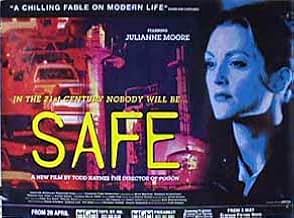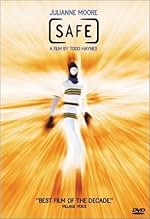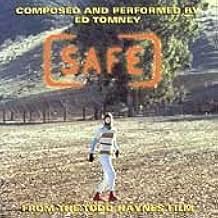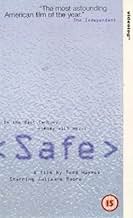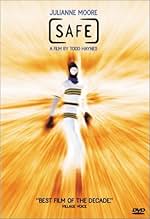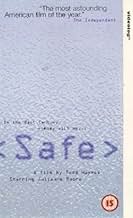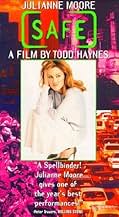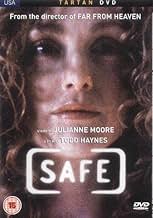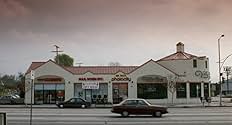An affluent and unexceptional homemaker in the suburbs develops multiple chemical sensitivity.An affluent and unexceptional homemaker in the suburbs develops multiple chemical sensitivity.An affluent and unexceptional homemaker in the suburbs develops multiple chemical sensitivity.
- Awards
- 4 wins & 13 nominations total
Martha Velez
- Fulvia
- (as Martha Velez-Johnson)
Chauncey Leopardi
- Rory
- (as Chauncy Leopardi)
Allan Wasserman
- Client
- (as Alan Wasserman)
Jean St. James
- Client's Wife
- (as Jean Pflieger)
- Director
- Writer
- All cast & crew
- Production, box office & more at IMDbPro
Featured reviews
9Lleu
I call this an important film because it deals with a very topical social issue in an original and subtle manner. It is also ambiguous (as the previous reviewer pointed out), which is something American audiences and critics often can't handle. Carol, an affluent suburban housewife played by Julianne Moore, is becoming increasingly disturbed and unable to cope with the alleged pollution and impurities in the environment. What could have been a "disease of the week" TV movie, however, is handled with surprising depth by director Todd Haynes. Carol ends up in a new agey community dedicated to healing people like herself. What is fascinating is that Safe, while exploring the pressures and toxicity of modern life, is also a brilliant look at the pathology of fleeing from life and seeking an environment of "purity." For Carol ends up, instead of recovering, more and more alienated and withdrawn. Safe does not provide answers to this dilemma, but it sure makes us look at some difficult questions.
Julianne Moore is one of my favorite actresses and that's the reason I decided to watch this one.
This film is labeled as Drama/Thriller. Well, the drama's here, no doubt, as Carol White (Moore) slowly begins to succumb to the multiple effects of all types of pollution that pervade our technocratic consumer societies. There's psychological drama also as her husband, Greg (Xander Berkeley) tries to come to some understanding about Carol and how his marriage seems to be slowly disintegrating. And, there's drama also when Carol reacts violently to various chemicals, such that she is hospitalized and undergoes a battery of tests...
But... Thriller? Not at all, not by a long shot.
This is something better than mere thrills at one level, it's a modern horror story that we are all living, because we are all part of this petrochemical world that we cannot reasonably escape. At another level, it's also the horror that results when a person decides to dislocate from the polluted world we all live in and construct another world within the mind. The end result of such an act is usually madness... eventually.
Beautifully acted by all the players, so that it seems that they aren't acting; it is, after all, all too real, is it not? The musical background is simply stunning brooding, dark, menacing, and reminiscent of a David Lynch soundtrack. Visually, for the first half, you are battered with repetitive images of unending lines of traffic, excessive noise, mindless activities, rampant consumerism all designed to reflect the battered mind and body of Carol as she struggles to determine her future in a world that is increasingly threatening.
How she does that forms the second half. Does she succeed? I could say Yes and No, but I'll leave it up to you to decide when you see it. Enjoy...if you can!
This film is labeled as Drama/Thriller. Well, the drama's here, no doubt, as Carol White (Moore) slowly begins to succumb to the multiple effects of all types of pollution that pervade our technocratic consumer societies. There's psychological drama also as her husband, Greg (Xander Berkeley) tries to come to some understanding about Carol and how his marriage seems to be slowly disintegrating. And, there's drama also when Carol reacts violently to various chemicals, such that she is hospitalized and undergoes a battery of tests...
But... Thriller? Not at all, not by a long shot.
This is something better than mere thrills at one level, it's a modern horror story that we are all living, because we are all part of this petrochemical world that we cannot reasonably escape. At another level, it's also the horror that results when a person decides to dislocate from the polluted world we all live in and construct another world within the mind. The end result of such an act is usually madness... eventually.
Beautifully acted by all the players, so that it seems that they aren't acting; it is, after all, all too real, is it not? The musical background is simply stunning brooding, dark, menacing, and reminiscent of a David Lynch soundtrack. Visually, for the first half, you are battered with repetitive images of unending lines of traffic, excessive noise, mindless activities, rampant consumerism all designed to reflect the battered mind and body of Carol as she struggles to determine her future in a world that is increasingly threatening.
How she does that forms the second half. Does she succeed? I could say Yes and No, but I'll leave it up to you to decide when you see it. Enjoy...if you can!
This film is a remarkable exploration of the subtle yet terrifying ways in which everyday life can consume us. The standout performance from Julianne Moore as Carol White, a housewife who becomes increasingly allergic to her environment, serves as the perfect vessel to capture this eerie and disturbing sense of unease.
Moore's portrayal of Carol is a masterclass in understated acting. Throughout the film, she communicates a deep sense of fear and confusion through subtle physical gestures and inflections of her voice. One scene, in particular, where she breaks down in tears in her car, encapsulates the intensity of her performance.
The horror of the film, however, is not in jump scares or gore, but in the slow burn of Carol's deterioration. As her symptoms worsen, she becomes isolated from her family and friends, unable to find solace in her own home or the outside world. The mundanity of her suburban life becomes a metaphor for the very thing that's slowly destroying her.
The film's conclusion is ambiguous, leaving us uncertain as to whether Carol can ever truly escape from the grip of her isolation and illness. This open-endedness adds to the overall sense of unease, reinforcing the idea that we're constantly under threat from the everyday world around us.
Safe is a haunting film that terrifies through its quiet and understated approach. Julianne Moore's exceptional performance is central to this, but the masterful direction and cinematography make it a complete work of art. It's a must-see for anyone interested in exploring the ways in which modern life can corrode our mental and physical health.
Moore's portrayal of Carol is a masterclass in understated acting. Throughout the film, she communicates a deep sense of fear and confusion through subtle physical gestures and inflections of her voice. One scene, in particular, where she breaks down in tears in her car, encapsulates the intensity of her performance.
The horror of the film, however, is not in jump scares or gore, but in the slow burn of Carol's deterioration. As her symptoms worsen, she becomes isolated from her family and friends, unable to find solace in her own home or the outside world. The mundanity of her suburban life becomes a metaphor for the very thing that's slowly destroying her.
The film's conclusion is ambiguous, leaving us uncertain as to whether Carol can ever truly escape from the grip of her isolation and illness. This open-endedness adds to the overall sense of unease, reinforcing the idea that we're constantly under threat from the everyday world around us.
Safe is a haunting film that terrifies through its quiet and understated approach. Julianne Moore's exceptional performance is central to this, but the masterful direction and cinematography make it a complete work of art. It's a must-see for anyone interested in exploring the ways in which modern life can corrode our mental and physical health.
Safe is perhaps a tad too ambiguous for its own good. The film focuses on a suburban housewife (Julianne Moore) who feels sick for no reason. Her doctor suggests psychological treatment, but she finds more comfort in the idea that her sickness is caused by environmental factors, such as car fumes and the like. Haynes never answers the question of what is really affecting Moore. One moment you're sure it's psychological, then physical symptoms displayed by the woman are undeniable. It's not that I really wanted the questions answered, but the constant toying with the audience does become a strain, especially as the film runs for two hours and not much happens. There's also the possibility that the story isn't meant to represent reality, but instead it might be allegorical. This makes it all the more difficult to unravel. I know I sound sort of negative in this review, but I did like it. I don't think it works completely, but I found it fascinating. One reason it does work at all is that Haynes' major goal seems to want to put us inside Moore's head. It shows us what it would be like to suffer and not know why, and how comfortable it might be to, say, join a cult, which is basically what she does in the end. Not entirely satisfying, but definitely well worth a look.
There are some that feel that a thriller has to be a rollercoaster ride with thrills and spills every minute. This film is not that kind of thriller. SAFE is like those chilling dreams where you are being dragged through something somewhat familiar yet otherworldly and just out of reach of total comprehension. Those sort of dreams are annoying, but we all have them anyway. Some people shrug them off, some think they can explain it away by analysis, and some just like to bask in the fact that they are mysterious, heart-palpitating, and fascinating. I'm in the latter category, and such is my love for this film. This film is like a kaleidoscope where the patterns seem fixed and definable, yet are constantly changing.
There's no doubt that Todd Haynes has something to say about the toxicity of our environment, the toxicity of our relationships, the toxicity of our generic society, and even the toxicity of our venues of healing. Doctors and psychiatrists for example, are cold and sterile and seemingly wearing blinders and cotton in their ears when it comes to really seeing or listening to their patients. New Age healers on the other hand are warm and receptive and seemingly interested in seeing you, hearing you and knowing you. But they trod down the same path that religious fundamentalists do. If your faith isn't strong enough; you won't be healed. One recollects New Age healers' like Louise Hay who claimed that AIDS victims had subliminal desires to hurt themselves, but could be cured with a strong dose of self-love. An especially nasty ruse, when one considers how most of society has already blamed the victim. AIDS victims shouldn't blame themselves, but they shouldn't believe that enough' faith will heal them either. So we can feel for Carol White (as generic sounding a name as one could imagine!) who knows her illness to be real, but who feels guilty nonetheless because no one will let her own her illness. They don't even know she exists, really. And she, from the beginning of this film, isn't sure either.
Carol is an enigma to herself. She's like a fish in an aquarium (her house in fact, looks sort of like a dungeon set in a space-age aquarium), only she never really saw her life as such until she reached the pinnacle of success defined by society. At the opening of the film, she's got it all': wealth, security, servants, friends', family' and health (well, for the time being). But what happens when you've reached the pinnacle of success? Just be happy going to dull social functions and decorate your proverbial palace? Carol begins to see her life her aquarium- from outside. It's dull, blue and facile. A person who has a sense of self could try to survive in the ocean' of life, but Carol isn't such a person. So it's not so unnatural that she might become so vilely inebriated by the blandness and inanity of her life that she can barely talk and ultimately, can barely breathe. One can get literally ill with an overdose of generic, stupefying life. Ever been stuck in a dentist's waiting room listening to the likes of Tony Orlando and Dawn or Linda Ronstadt? We're talking real nausea here! So imagine being a person who lives in a 24/7 world of pastel colours, pop musak, shopping, vacuous conversation with friends', and being married to a man who has less charisma than a houseplant. Depression of that magnitude would leave any person raw. Carol's blues (which we can see literally in the lighting of her house and in the God-awful furniture) have broken her. Once she realized how raw she'd become, she lost all sense emotionally and physically- in how to cope. Perhaps the reason that no one could help her was that they were all too busy enjoying the decor of their proverbial aquariums. Her husband, her friends, her doctors, even the new Age healers, LIKE the limited, appropriately fashioned, seemingly inoffensive world they've found their niche in. Gosh knows, I've thought myself nuts for not being part of the majority of the population that likes shopping malls, industrial architecture, Nike, Julia Roberts, or franchise coffee houses' that serve their overpriced coffee in paper cups. I kind of understand why Carol would want to bury herself in an igloo by the end of the film. But New-Agey as it may be, there is a glimmer of hope when she stands at the mirror and chokes out `I love you' to her reflection. It's not exactly Descartes' `I think, therefore I am', but its affirmation enough that she does indeed have a face and a heart. She does indeed exist. I think that's what Todd Haynes' message to us is. SAFE is a cry for us to take a good, hard look at the world around us, to recognize its variety of poisons, and to make a stand to save it and to save ourselves.
There's no doubt that Todd Haynes has something to say about the toxicity of our environment, the toxicity of our relationships, the toxicity of our generic society, and even the toxicity of our venues of healing. Doctors and psychiatrists for example, are cold and sterile and seemingly wearing blinders and cotton in their ears when it comes to really seeing or listening to their patients. New Age healers on the other hand are warm and receptive and seemingly interested in seeing you, hearing you and knowing you. But they trod down the same path that religious fundamentalists do. If your faith isn't strong enough; you won't be healed. One recollects New Age healers' like Louise Hay who claimed that AIDS victims had subliminal desires to hurt themselves, but could be cured with a strong dose of self-love. An especially nasty ruse, when one considers how most of society has already blamed the victim. AIDS victims shouldn't blame themselves, but they shouldn't believe that enough' faith will heal them either. So we can feel for Carol White (as generic sounding a name as one could imagine!) who knows her illness to be real, but who feels guilty nonetheless because no one will let her own her illness. They don't even know she exists, really. And she, from the beginning of this film, isn't sure either.
Carol is an enigma to herself. She's like a fish in an aquarium (her house in fact, looks sort of like a dungeon set in a space-age aquarium), only she never really saw her life as such until she reached the pinnacle of success defined by society. At the opening of the film, she's got it all': wealth, security, servants, friends', family' and health (well, for the time being). But what happens when you've reached the pinnacle of success? Just be happy going to dull social functions and decorate your proverbial palace? Carol begins to see her life her aquarium- from outside. It's dull, blue and facile. A person who has a sense of self could try to survive in the ocean' of life, but Carol isn't such a person. So it's not so unnatural that she might become so vilely inebriated by the blandness and inanity of her life that she can barely talk and ultimately, can barely breathe. One can get literally ill with an overdose of generic, stupefying life. Ever been stuck in a dentist's waiting room listening to the likes of Tony Orlando and Dawn or Linda Ronstadt? We're talking real nausea here! So imagine being a person who lives in a 24/7 world of pastel colours, pop musak, shopping, vacuous conversation with friends', and being married to a man who has less charisma than a houseplant. Depression of that magnitude would leave any person raw. Carol's blues (which we can see literally in the lighting of her house and in the God-awful furniture) have broken her. Once she realized how raw she'd become, she lost all sense emotionally and physically- in how to cope. Perhaps the reason that no one could help her was that they were all too busy enjoying the decor of their proverbial aquariums. Her husband, her friends, her doctors, even the new Age healers, LIKE the limited, appropriately fashioned, seemingly inoffensive world they've found their niche in. Gosh knows, I've thought myself nuts for not being part of the majority of the population that likes shopping malls, industrial architecture, Nike, Julia Roberts, or franchise coffee houses' that serve their overpriced coffee in paper cups. I kind of understand why Carol would want to bury herself in an igloo by the end of the film. But New-Agey as it may be, there is a glimmer of hope when she stands at the mirror and chokes out `I love you' to her reflection. It's not exactly Descartes' `I think, therefore I am', but its affirmation enough that she does indeed have a face and a heart. She does indeed exist. I think that's what Todd Haynes' message to us is. SAFE is a cry for us to take a good, hard look at the world around us, to recognize its variety of poisons, and to make a stand to save it and to save ourselves.
Did you know
- TriviaWhen it came time for Julianne Moore to record the director's commentary for the 2003 DVD release, this was the first time the lead actress had seen the movie in its entirety.
- GoofsAlthough this film was explicitly set in 1987, while Carol is driving on the highway, she passes a burgundy 1992 Cadillac de Ville.
- Quotes
Carol White: [about her declining health] I'm sorry. I know it's not normal but I can't help it.
- How long is Safe?Powered by Alexa
Details
- Release date
- Countries of origin
- Languages
- Also known as
- A salvo
- Filming locations
- Production companies
- See more company credits at IMDbPro
Box office
- Budget
- $1,000,000 (estimated)
- Gross US & Canada
- $512,245
- Opening weekend US & Canada
- $15,830
- Jun 25, 1995
- Gross worldwide
- $512,558
Contribute to this page
Suggest an edit or add missing content


